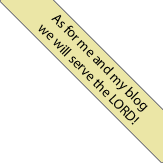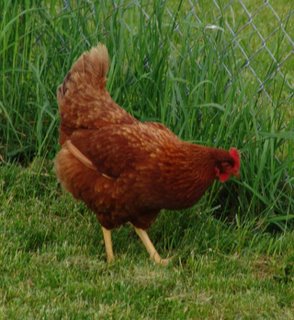Animals, Part 5
This is the fifth installment of my series on why we raise animals. If you want to read from the beginnning, scroll down the page to "part 1".
Here’s a rather obvious reason for raising livestock: self-sufficiency. Less dependence on “the system” to provide your family’s food. Being able to do it yourself without relying on companies that you know nothing about (How organic are they? What conditions do they raise their animals in? etc.) Less dependence on your finances. Less dependence on your vehicle. Less dependence on the gas your vehicle guzzles. (Side note: we don’t use our vehicles any less than we did before we got our animals, but I think we have more freedom to use them less if we wanted to.)
There’s something else that I think is probably at the back of everyone’s minds these days: these are very uncertain times we live in. There are many ways in which our lives could change that would necessitate becoming more self-sufficient, including but not limited to: bird flu, unemployment, electromagnetic pulse power outages, natural disasters, political unrest, increasing fuel prices causing unmanageable inflation, and nuclear war. Have I missed anything? I probably have. What would happen if we no longer had access to a fully stocked supermarket? That would be a huge transition for any of us, whether you have livestock or not. But for those with animals, the transition would not be quite so life-threatening. Caring for animals (and/or having a garden) is excellent disaster insurance.
Not only that, but it is also a sign that you are serious about providing for your family no matter what difficulties may come your way. You aren’t looking to others or to the government to bail you out when the going gets rough. This is not to say that not having animals or a garden means you are not serious about providing for your family. Not at all. But if you do want to be serious about providing, this is a good way to do it!
Here’s a rather obvious reason for raising livestock: self-sufficiency. Less dependence on “the system” to provide your family’s food. Being able to do it yourself without relying on companies that you know nothing about (How organic are they? What conditions do they raise their animals in? etc.) Less dependence on your finances. Less dependence on your vehicle. Less dependence on the gas your vehicle guzzles. (Side note: we don’t use our vehicles any less than we did before we got our animals, but I think we have more freedom to use them less if we wanted to.)
There’s something else that I think is probably at the back of everyone’s minds these days: these are very uncertain times we live in. There are many ways in which our lives could change that would necessitate becoming more self-sufficient, including but not limited to: bird flu, unemployment, electromagnetic pulse power outages, natural disasters, political unrest, increasing fuel prices causing unmanageable inflation, and nuclear war. Have I missed anything? I probably have. What would happen if we no longer had access to a fully stocked supermarket? That would be a huge transition for any of us, whether you have livestock or not. But for those with animals, the transition would not be quite so life-threatening. Caring for animals (and/or having a garden) is excellent disaster insurance.
Not only that, but it is also a sign that you are serious about providing for your family no matter what difficulties may come your way. You aren’t looking to others or to the government to bail you out when the going gets rough. This is not to say that not having animals or a garden means you are not serious about providing for your family. Not at all. But if you do want to be serious about providing, this is a good way to do it!











0 Comments:
Post a Comment
<< Home